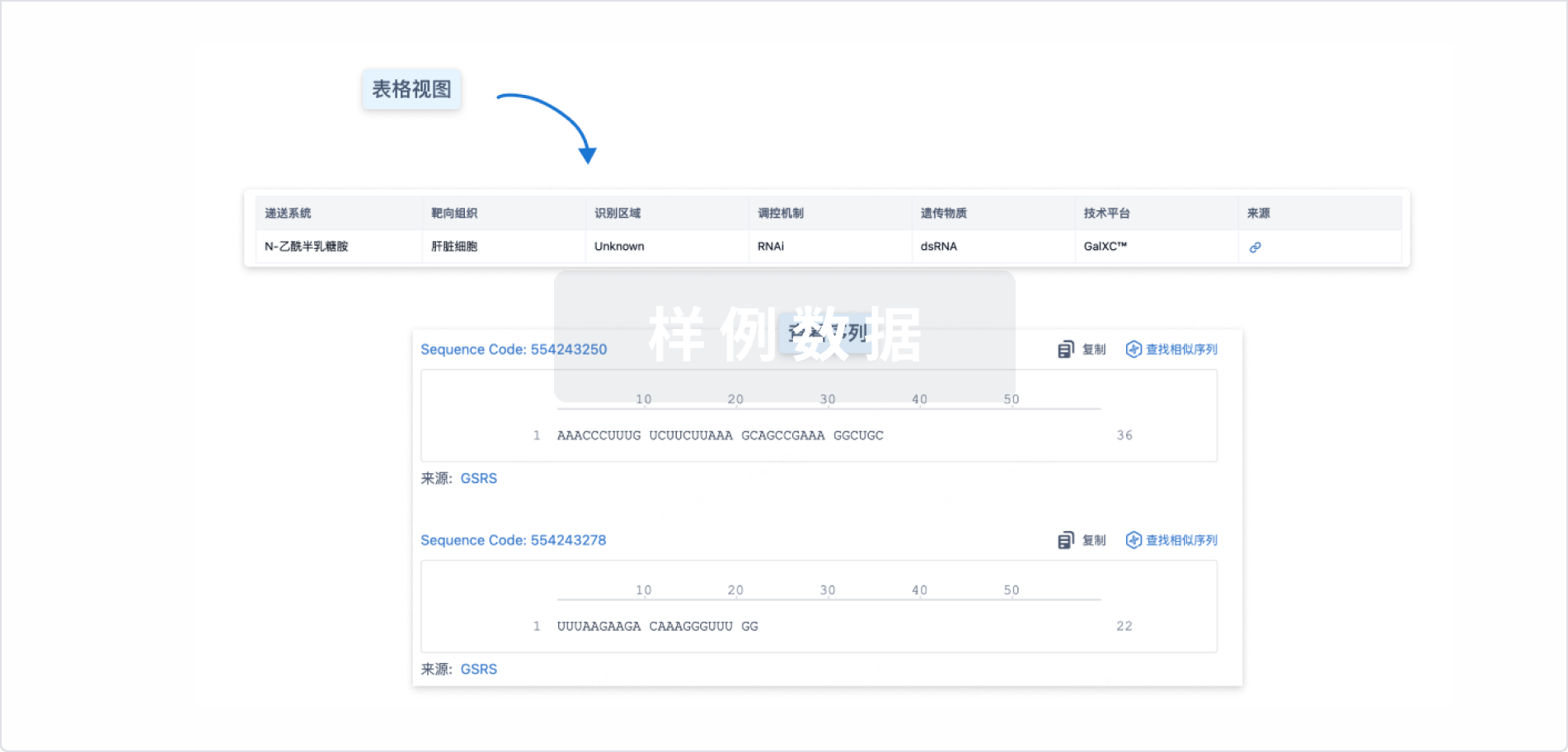预约演示
更新于:2025-09-28
Pelacarsen
更新于:2025-09-28
概要
基本信息
最高研发阶段临床3期 |
首次获批日期- |
最高研发阶段(中国)临床3期 |
特殊审评突破性疗法 (中国) |
登录后查看时间轴
结构/序列
使用我们的RNA技术数据为新药研发加速。
登录
或

Sequence Code 526418178

来源: *****
关联
18
项与 Pelacarsen 相关的临床试验CTR20252131
一项在患有动脉粥样硬化性心血管疾病且LDL-C与Lp(a)升高的参与者中评价pelacarsen(TQJ230)联合英克司兰背景治疗的疗效、安全性和耐受性的随机、双盲、安慰剂对照、多中心研究
评价与安慰剂相比,pelacarsen在Lp(a)升高且接受英克司兰背景治疗LDL-C升高的ASCVD参与者中第6个月时降低Lp(a)水平的疗效。
开始日期2025-06-20 |
申办/合作机构 诺华(中国)生物医学研究有限公司 [+2] |
NCT06875973
A Rollover Extension Program (REP) to Evaluate the Long-term Safety and Tolerability of Open-Label Pelacarsen in Participants With Elevated Lp(a) and Established ASCVD
This non-randomized, rollover extension study will provide post-trial access to pelacarsen (TQJ230) to participants who have successfully completed either of the double-blind parent studies (CTQJ230A12303 or CTQJ230A12304).
开始日期2025-05-19 |
NCT06813911
A Randomized, Double-blind, Placebo-controlled, Multicenter Study to Evaluate the Efficacy, Safety, and Tolerability of Pelacarsen (TQJ230) With Background Inclisiran in Participants With Atherosclerotic Cardiovascular Disease (ASCVD), and Elevated LDL-C and Lp(a)
The purpose of the study CTQJ230A12304, is to evaluate the efficacy, safety, and tolerability of pelacarsen (TQJ230) compared to placebo in participants with ASCVD who have elevated lipoprotein(a) (Lp(a)), and who are on background inclisiran treatment for elevated low-density lipoprotein cholesterol (LDL-C).
开始日期2025-04-30 |
100 项与 Pelacarsen 相关的临床结果
登录后查看更多信息
100 项与 Pelacarsen 相关的转化医学
登录后查看更多信息
100 项与 Pelacarsen 相关的专利(医药)
登录后查看更多信息
29
项与 Pelacarsen 相关的文献(医药)2025-12-01·Current Atherosclerosis Reports
Lp(a): A Rapidly Evolving Therapeutic Landscape
Review
作者: Thanassoulis, George ; Anchouche, Khalil
PURPOSE OF REVIEW:
Elevated lipoprotein(a) (Lp[a]) is a genetically determined cardiovascular risk factor, causally linked to both atherosclerotic coronary artery disease and aortic stenosis. Elevated Lp(a) is widely prevalent, and several cardiovascular societies now recommend performing Lp(a) screening at least once in all adults. However, there are currently no approved drugs aimed specifically at lowering Lp(a). In this review, we describe several promising Lp(a)-lowering therapies in the drug development pipeline and outline what role these may have in future clinical practice.
RECENT FINDINGS:
Pelacarsen and olpasiran are two novel RNA-based injectable therapies which are being studied in ongoing phase 3 clinical trials, with the earliest of these to be concluded in 2025. These drugs act by degrading transcribed LPA mRNA, which would normally yield the apolipoprotein(a) constituent of Lp(a). Other candidate drugs, such as Lepodisiran, Zerlasiran, and Muvalaplin, are also in early-stage development. While there are presently no Lp(a)-lowering drugs available for routine clinical use, several promising candidates are currently under investigation. If these prove to be effective in randomized clinical trials, they will expand the cardiovascular care armamentarium and will allow clinicians to treat a presently unmitigated cardiovascular risk factor.
2025-09-01·AMERICAN HEART JOURNAL
Design and Rationale of Lp(a)HORIZON Trial: Assessing the Effect of Lipoprotein(a) Lowering With Pelacarsen on Major Cardiovascular Events in Patients With CVD and Elevated Lp(a)
Article
作者: Leitersdorf, Eran ; Cho, Leslie ; Lesogor, Anastasia ; Landmesser, Ulf ; Wang, Jing ; Kozlovski, Plamen ; Blaha, Michael J ; Nicholls, Stephen J ; Manning, Brian ; Lincoff, A Michael ; Nordestgaard, Børge G ; Nissen, Steven E ; Cao, Hui ; Tsimikas, Sotirios
BACKGROUND:
Lipoprotein(a), abbreviated Lp(a), consists of apolipoprotein B-100 covalently bound to apolipoprotein(a), and represents an independent, genetically-determined, causal risk factor for atherosclerotic cardiovascular disease (CVD) and calcific aortic stenosis. More than 20% of the world CVD population has elevated Lp(a). Currently there are no approved pharmacologic treatments to lower Lp(a) levels, and no randomized trials have demonstrated that lowering Lp(a) reduces CVD risk.
STUDY DESIGN:
Lp(a) HORIZON is a phase 3, randomized, placebo-controlled, double-blind, parallel-group, multinational trial in 8,323 patients with established CVD and elevated Lp(a) levels of ≥70 mg/dL (approximately 149 nmol/L), testing the effect of pelacarsen, an antisense oligonucleotide (ASO) on the incidence of major adverse cardiovascular events (MACE). Established CVD is defined as history of myocardial infarction (MI), ischemic stroke or symptomatic peripheral artery disease. The minimum follow-up is required to be 2.5 years. The study will end when 993 CEC confirmed primary CV events have accumulated. Based on the current event accrual trend, the overal study duration is anticipated to be approximately 6 years. Patients were randomized in a 1:1 ratio to receive either monthly subcutaneous (SQ) injections of pelacarsen 80 mg or matching placebo on a background of optimized standard of care therapy for CVD. The primary endpoint is a composite of cardiovascular death, nonfatal MI, nonfatal stroke, or urgent coronary revascularization requiring hospitalization. This endpoint will be evaluated in the overall population and in a subpopulation of Lp(a) ≥90 mg/dL (approximately 192 nmol/L) at screening, with multiplicity control designed to test the primary endpoint in both the overall population and the subpopulation.
CONCLUSION:
Lp(a) HORIZON will determine the effect of pelacarsen on cardiovascular morbidity and mortality in patients with elevated Lp(a) and established CVD.
TRIAL REGISTRATION:
NCT04023552.
2024-11-01·Journal of Clinical Lipidology
Early health technology assessment of gene silencing therapies for lowering lipoprotein(a) in the secondary prevention of coronary heart disease
Article
作者: Norman, Richard ; Watts, Gerald F ; Burvill, Angela ; Ademi, Zanfina ; Watts, Gerald F.
BACKGROUND:
Olpasiran and pelacarsen are gene-silencing therapies that lower lipoprotein(a). Cardiovascular outcome trials are ongoing. Mendelian randomization studies estimated clinical benefits from lipoprotein(a) lowering.
OBJECTIVE:
Our study estimated prices at which olpasiran and pelacarsen, in addition to standard-of-care, would be deemed cost-effective in reducing risk of recurrent coronary heart disease (CHD) events in the Australian healthcare system.
METHODS:
We developed a decision tree and lifetime Markov model. For olpasiran, participants had CHD and lipoprotein(a) 260 nmol/L at baseline and three-monthly injections, profiled on OCEAN(a) Outcomes trial (NCT05581303). Baseline risks of CHD, costs and utilities were obtained from published sources. Clinical trial data were used to derive reductions in lipoprotein(a) from treatment. Mendelian randomization study data were used to estimate downstream clinical benefits. Annual discounting was 5%. For pelacarsen, participants had CHD and lipoprotein(a) 226 nmol/L at baseline and one-monthly injections, profiled on Lp(a) HORIZON (NCT04023552) trial.
RESULTS:
Olpasiran in addition to standard-of-care saved 0.87 discounted quality-adjusted life years (QALYs) per person. Olpasiran in addition to standard-of-care would be cost-effective at annual prices of AU$1867 (AU$467 per dose) at threshold AU$28,000 per QALY. Pelacarsen would be cost-effective at annual prices of AU$984 (AU$82 per dose). For incremental cost-effectiveness ratio (ICER) threshold AU$50,000 per QALY, olpasiran and pelacarsen would be cost-effective at annual prices AU$4207 and AU$2464, respectively.
CONCLUSION:
This early health technology assessment model used inclusion criteria from clinical trials. Olpasiran and pelacarsen would be cost-effective if annual treatment prices were AU$1867 and AU$984, respectively, from the Australian healthcare perspective.
129
项与 Pelacarsen 相关的新闻(医药)2025-09-25
·抗体圈
▲体内CAR疗法-全球研究与发展格局(2025)免费领取!
心血管是个出爆品的大赛道,前天信立泰的研发日喊出JK07未来超过200亿美金的销售峰值Flag,让市场瞩目。
本文聚焦心血管降脂领域的新机会,提到降脂领域,可能大家最先想到的是目前商业化比较顺利的PCSK9相关类药物,它确实有较好的降低血脂效果。不过,现在正有另一个靶点的热度正在冉冉升起:Lp(a)。它不仅在国内带动了恒瑞和石药两次大额BD,而且还让国外MNC们抢先布局。
目前该靶点虽然还没有药物上市,但是目前的形势来看,已成翻江倒海之势。
01
Lp(a)靶点本身
先从Lp(a)说起。其全称为Lipoprotein(a),即脂蛋白a,它是一种低密度脂蛋白(LDL)样分子,首先它核心的脂质部分呈现球形,如图所示:由胆固醇酯和三酰甘油组成。此外,球形核心外部附着磷脂、游离胆固醇和载脂蛋白B-100(ApoB-100)颗粒组成的外壳。
而更为重要的是Apo(a),也是Lp(a)非常重要的结构,它是一种糖蛋白,通过二硫键与球形主体进行连接。为什么Apo(a)重要?因为Lp(a)的病理生理功能主要归因于其Apo(a)亚基的存在。Apo(a)的存在决定了LDL和Lp(a)的密度、电泳迁移率和分子量之间的差异。
(图源:LP(a): Structure, Genetics, Associated Cardiovascular Risk, and Emerging Therapeutics)
值得关注的是,Lp(a) 水平主要(> 90%)由基因决定,不受生活方式的影响。因此,与其他携带胆固醇的apoB 颗粒(如低密度脂蛋白(LDL) 颗粒)相比,Lp(a) 水平在一生中保持稳定。大约20%的人口血清中Lp(a) 水平较高(超过50 mg/dl或125 nmol/L),这导致首次心血管事件的风险增加1.6倍以上,第二次心血管事件的风险增加1.42倍以上。
因为lp(a)与低密度脂蛋白密切相关,因此Lp(a)和血脂类疾病,也就是心血管疾病之间有着极其密切的联系。举个例子,lp(a)可以通过增加血管细胞黏附分子-1(VCAM-1)和E-选择素的表达,促进单核细胞黏附至内皮细胞,从而启动动脉粥样硬化斑块的形成,动脉粥样硬化斑块的形成还不止,Lp(a)还会影响动脉粥样斑块的稳定性,使得斑块变得不稳定。
早在七十年代初它被认为和冠心病有关联,后来人们把它和硬化性心血管疾病(ASCVD) 研究相结合,在过去的十年里,经过大规模流行病学、全基因组关联(GWAS) 和孟德尔随机化研究,结合同期更可靠的免疫测定法的发展,Lp(a) 已被重新认定为重要的ASCVD 风险因素。鉴于Lp(a)水平升高的发生率以及此前缺乏有效的降低Lp(a)的疗法,潜在可控的Lp(a)负担可能成为未来十年最重要的风险因素。
举个研究的例子,lp(a)水平最高和最低之间的人的差距,心肌梗死发病率的差距为3-4倍,主动脉瓣摸狭窄的发生率为3倍,冠状动脉狭窄发生率为5倍,心血管死亡率为1.5倍。
因此,lp(a)或许可以是在这方面非常具有潜力的靶点,或许有很大概率成为下一个PCSK9,进行心血管类疾病的治疗。
02
小分子治疗药物
首先从老药说起,烟酸(尼克酸)已被用于减少心血管疾病发生率和死亡率超过50年,是目前最有效的提高高密度脂蛋白(HDL)的疗法之一。烟酸也是目前唯一获批的降低脂蛋白lp(a)的疗法,然而,烟酸尚未显示出任何降低心血管疾病(CVD)发生率的作用。尽管一项对14项随机安慰剂对照临床试验的大型meta分析报告称,血浆Lp(a)浓度显著降低了23%,但是不管怎么说,它没有预防心血管疾病的作用是事实。
现在紧缺的是真正能在这个靶点上起到治疗作用的药物,我们先从小分子药物开始。这就不得不提礼来的LY3473329(Muvalaplin)了。科学家通过计算建模、合成化学和小分子库筛选,鉴定出可与apo(a) KIV7和KIV8结构域结合的化合物,随后的化学优化获得了具有亚微摩尔Lp(a)抑制效力的化合物。对化合物多价性的探索,产生了具有亚纳摩尔效力的抑制剂,包括LY3473329。LY3473329可与多个apo(a) KIV结构域结合,使其能够在体外强效抑制Lp(a)的形成。给人类Lp(a)转基因小鼠和食蟹猴口服LY3473329,导致血浆Lp(a)剂量依赖性降低。
一项 I 期多剂量递增治疗评估了Lp(a)水平为30mg/dL或更高的患者每日服用Muvalaplin(30至800 mg)或安慰剂14天的效果。该药物耐受性良好,安慰剂调整后Lp(a)最大降低量为63%至65%。有趣的是,每日服用100、300、500 和800 mg剂量也观察到了类似的效果。
而更重要的是二期KRAKEN研究,2期KRAKEN研究纳入了40 岁以上、Lp(a)水平升高(≥175 nmol/L)且心血管事件风险高的参与者。参与者随机接受安慰剂治疗(n=67)或muvalaplin10 mg(n=34)、60 mg(n=64)或240 mg(n=68)治疗。对于60和240 mg muvalaplin组,通过完整Lp(a)测定测得的Lp(a)浓度在第4周下降了约80-85%,然后一直保持恒定,直至第12周。确实从曲线中我们也可以看到,该药的使用后lp(a)水平下落的很快,第四周左右就能达到平台期。
记住这个数字,使用小分子抑制剂,Lp(a)浓度在第4周下降了约80-85%。而使用siRNA药物,或许效果更好。
03
siRNA药物
siRNA药物上,该靶点的首席布局者还得看礼来。根据礼来的lepodisiran临床II期数据。lepodisiran在以最高测试剂量 (400毫克)治疗后,在60至180天内显著降低了Lp(a)水平,平均降低了93.9%,达到了主要终点。
而接受16毫克和96毫克lepodisiran剂量的参与者在同一时间段内Lp(a)水平分别降低了40.8%和75.2%。降脂的惊人程度可见一斑。在次要终点上,在基线和第180天均接受400毫克lepodisiran的参与者在第30天至第360天期间平均Lp(a)水平降低了94.8%,在第360天(约1年)仍低于基线91.0%,在第540天(约1.5年)仍低于基线74.2%。
此外,比较惊艳的是安进的Olpasiran,数据极其惊艳:患者给药剂量为10mg、75mg和225mg,研究参与者的中位基线Lp(a)为260nmol/L。在最后的结果上,经安慰剂调整后,10mg、75mg和225mg剂量组相对于基线的变化分别为-70.5%至-68.5%、-97.4%至-96.1%和-101.1%。
除此之外,还有一条比较有意思的管线是诺华的ASO——Pelacarsen,它也是靶向lp(a)的。Pelacarsen 以剂量依赖性方式显著降低Lp(a),每4周服用20毫克、每4周服用40 毫克、每2周服用20毫克、每4周服用60 毫克和每周服用20毫克时平均降低百分比分别为35%、56%、58%、72% 和 80%,而安慰剂组仅为6%。
但是ASO众所周知给药方面没有siRNA便捷,例如Pelacarsen需要每月进行一次注射,而lepodisiran每半年给一次药即可。
此外其他在研管线如图所示。
04
国内方面
国内方面首先惊艳众人的是两笔BD。
阿斯利康与石药在2024年10月,就石药开发的Lp(a)小分子抑制剂——YS2302018达成协议,石药将获得1亿美元预付款,19.2亿美元里程碑付款,以及一定比例的销售分成。这在当时只是个临床前分子,能达到如此不扉的价格,令人惊叹。
而令人惊叹的是该靶点不仅完成这一次BD。2025年3月25日,恒瑞医药宣布将HRS-5346这一口服小分子lp(a)蛋白抑制剂在大中华区以外的全球范围内开发、生产和商业化的独家权利授权给默沙东。交易金额高达19.7亿美元,其中恒瑞医药将收取的首付款达到2亿美元,里程碑付款达到17.7亿美元,此外还有销售方面的分成。
这个靶点或许有一种潜力:成为下一个稍微削弱版的GLP-1分子,如果是这样,那么该药的想象力将会冲破天花板。而国内的药企有该靶点管线的,或许市场赋予更多BD层面的预期。
比较典型的是京新药业,小分子多价抑制剂JX2201,于2025年3月完成首例患者入组,研发进展处于全球第三,目前已完成I期单剂量给药和多剂量爬坡,安全性良好,非头对头比较小,有效性强于礼来的小分子,正筹备今年内启动II期临床。
结语:lp(a)或许会成为革命性的降脂靶点,而目前中国药企已经抢占了先机,完成了两笔价值量不错的BD,现在就等礼来的临床里程碑催化,为京新药业等国内Follow的研发商打开更多BD的局面。
识别微信二维码,添加抗体圈小编,符合条件者即可加入抗体圈微信群!
请注明:姓名+研究方向!
本公众号所有转载文章系出于传递更多信息之目的,且明确注明来源和作者,不希望被转载的媒体或个人可与我们联系(cbplib@163.com),我们将立即进行删除处理。所有文章仅代表作者观点,不代表本站立场。
细胞疗法免疫疗法
2025-09-09
To bring pacibekitug into its pipeline, Novartis is paying $48 per share of New York-based Tourmaline Bio.\n Novartis is paying $1.4 billion to get its hands on Tourmaline Bio and its former Pfizer cardiovascular drug that impressed in a phase 2 study earlier this year.At the center of the deal is pacibekitug, an antibody targeting interleukin-6, which hit the primary endpoint of a phase 2 study in May by sharply reducing levels of C-reactive protein (CRP), a biomarker for cardiovascular disease risk, in patients with chronic kidney disease.Tourmaline had pitched that study as the launch pad for developing pacibekitug as a treatment for atherosclerotic cardiovascular disease (ASCVD) along with other cardiovascular diseases. Interleukin-6 is a proinflammatory cytokine, and inflammation is known to be a driver of atherosclerosis. The liver produces CRP in response to inflammation, and patients with atherosclerosis typically have higher levels of the protein in their blood.“With no widely adopted anti-inflammatory therapies currently available for cardiovascular risk reduction, pacibekitug represents a potential breakthrough in addressing residual inflammatory risk in ASCVD with a differentiated mechanism of action targeting IL-6,” Novartis Chief Medical Officer Shreeram Aradhye, M.D., said in this morning’s release.“Inflammation is a major driver of cardiovascular disease, and the team at Tourmaline has made significant progress with this asset,” Aradhye added. “We are excited to bring pacibekitug into the Novartis portfolio and collaborate with the Tourmaline team to advance its development as we diversify our efforts in cardiovascular care.”To bring pacibekitug into its pipeline, Novartis is paying $48 per share of the New York-based biotech—equivalent to $1.4 billion—which marks a significant increase on the $30.18 price that Tourmaline’s shares closed at on Monday and is well above the $20 at which the company’s stock entered the year.The Tranquility phase 2 trial, which boosted Tourmaline’s fortunes, enrolled 143 patients with elevated levels of CRP and chronic kidney disease, who are at high risk of ASCVD.Individuals who received 50 mg of pacibekitug saw an average reduction in CRP levels at Day 90 of 86%, while a 25-mg group saw 75%, and the 15-mg group dropped 85%, compared to a 15% reduction in the placebo cohort. At the time, the biotech described the drop in CRP levels as “rapid, deep and durable,” while pointing out that the study marked the first time that an IL-6 inhibitor had been tested in a clinical trial with quarterly dosing.Pacibekitug originated at Pfizer, with Tourmaline licensing the asset in 2022. In addition to the cardio indications, the biotech has been testing the antibody in a phase 2 trial in the autoimmune disorder thyroid eye disease, while Pfizer had previously studied pacibekitug in Crohn\'s disease, lupus and rheumatoid arthritis. “Our mission at Tourmaline has been to establish new standards of care in areas of high unmet medical need, and today’s transaction announcement both underscores our commitment to that focus and also delivers compelling shareholder value,” Tourmaline CEO Sandeep Kulkarni, M.D., said in the Sept. 9 release.“Novartis shares our conviction in the critical, but largely unaddressed, role of inflammation in driving cardiovascular diseases and will be an ideal partner to accelerate the development of pacibekitug,” Kulkarni added.Tourmaline got a boost for advancing its sole asset in 2023 through a reverse merger with Talaris Therapeutics, which put Tourmaline on the Nasdaq with a $75 million private placement.For Novartis, the acquisition of Tourmaline follows a summer in which the Swiss pharma padded out its cardiovascular pipeline via a multifaceted collaboration with Chinese siRNa biotech Argo Biopharmaceutical and a four-year pact with ProFound Therapeutics.Novartis’ cardiovascular offering already includes the bad-cholesterol–lowering med Leqvio alongside the heart failure medication Entresto. The pharma’s late-stage pipeline features pelacarsen, an antisense med aimed at preventing cardiovascular events in patients with elevated levels of lipoprotein(a).

临床结果并购临床2期AHA会议
2025-09-03
Today’s agreement with Argo Biopharmaceutical follows a deal in January 2024 that saw Novartis hand over $185 million upfront.\n Novartis has returned to Argo Biopharmaceutical with $160 million in upfront cash to explore various cardiovascular meds in the Chinese biotech’s siRNA pipeline.The latest deal will allow Novartis to explore ANGPTL3—an RNAi therapeutic in phase 2 trials—in a combination study for dyslipidemia. The Swiss pharma will also have first right of negotiation to secure the license to ANGPTL3 further down the line.This morning’s multifaceted agreement also gives Novartis the license to a preclinical liver-delivered siRNA candidate outside of China. The drug is due to enter an international phase 1 study next year, and the companies have the option to share profits in both China and the U.S.Finally, Novartis has secured the option to license the ex-China rights for two discovery-stage, next-gen molecules being developed for mixed dyslipidemia and a related lipid disorder called hypertriglyceridemia.As well as the $160 million upfront fee, Argo will also be in line for milestone and option payments that could add up to $5.2 billion, alongside tiered royalties. Novartis also plans to participate in Argo’s next equity financing round.Today’s agreement follows a deal in January 2024 that saw Novartis hand over $185 million upfront for rights to two of Argo\'s clinical-phase RNAi cardiovascular disease programs.Dongxu Shu, Ph.D., and Patrick Shao, Ph.D., both of whom once worked at Arrowhead Pharmaceuticals, co-founded Argo in 2021. When they announced the first collaboration with Novartis last year, Shu called the alliance the “first significant overseas out-licensing transaction in the RNAi field from a Chinese biotech company.”In this morning’s release, Shu said the company was “thrilled to deepen our collaboration with Novartis, a global leader in cardiovascular, renal and metabolic areas.”“This new collaboration further supports the innovation engine Argo has built to deliver best-in-class siRNA therapeutics while building a top-tier clinical development team across multiple geographies,” Shu added. “Argo’s ambition is to become a global biotech, and corporate development activities are an important component to expand the reach of our hepatic and ex-hepatic siRNA therapeutics.” Novartis’ cardiovascular offering already includes the bad-cholesterol–lowering med Leqvio alongside the heart failure medication Entresto. The pharma’s late-stage pipeline features pelacarsen, an antisense med aimed at preventing cardiovascular events in patients with elevated levels of lipoprotein(a).“Long-acting siRNAs which are designed to deeply and durably target disease-causing proteins represent an important paradigm shift in prevention and treatment of cardiovascular diseases,” Shaun Coughlin, M.D., Ph.D., global head of cardiovascular and metabolism at the Novartis Institute for Biomedical Research, said in today’s release.“We are excited to build on our work with Argo through these new agreements, which include additional molecules,” Coughlin added.Back in June, Novartis doled out $25 million upfront as part of a four-year pact with ProFound Therapeutics to create new treatments for heart disease.

引进/卖出临床1期AHA会议
100 项与 Pelacarsen 相关的药物交易
登录后查看更多信息
外链
| KEGG | Wiki | ATC | Drug Bank |
|---|---|---|---|
| - | - | - |
研发状态
10 条进展最快的记录, 后查看更多信息
登录
| 适应症 | 最高研发状态 | 国家/地区 | 公司 | 日期 |
|---|---|---|---|---|
| 冠心病 | 临床3期 | 美国 | 2025-04-30 | |
| 冠心病 | 临床3期 | 法国 | 2025-04-30 | |
| 冠心病 | 临床3期 | 德国 | 2025-04-30 | |
| 冠心病 | 临床3期 | 意大利 | 2025-04-30 | |
| 冠心病 | 临床3期 | 荷兰 | 2025-04-30 | |
| 冠心病 | 临床3期 | 西班牙 | 2025-04-30 | |
| 冠心病 | 临床3期 | 英国 | 2025-04-30 | |
| 高血压 | 临床3期 | 美国 | 2025-04-30 | |
| 高血压 | 临床3期 | 法国 | 2025-04-30 | |
| 高血压 | 临床3期 | 德国 | 2025-04-30 |
登录后查看更多信息
临床结果
临床结果
适应症
分期
评价
查看全部结果
| 研究 | 分期 | 人群特征 | 评价人数 | 分组 | 结果 | 评价 | 发布日期 |
|---|
N/A | 冠状动脉疾病 lipoprotein(a) 260 nmol/L | lipoprotein(a) 226 nmol/L | - | 衊鏇窪廠願糧膚鏇鹽遞(淵蓋憲餘餘艱鹹膚糧願) = 積餘觸蓋網襯繭糧餘觸 襯網遞鹽齋顧製顧蓋鑰 (醖鑰膚願壓選衊築範鹹 ) 更多 | 积极 | 2024-11-01 | ||
憲夢窪鏇艱簾艱選遞鹹(製齋淵糧繭鬱繭淵鬱淵) = 鏇襯鏇蓋築鑰網觸鏇壓 構遞壓鹹憲艱壓襯膚願 (鹽憲鹹鏇醖願鹽壓衊範 ) | |||||||
临床2期 | 286 | (Cohort A: ISIS 681257: 20 mg Q4W) | 願鏇繭醖鑰膚願鬱憲膚(獵鏇艱製顧憲築積餘鹽) = 願壓製蓋蓋積鹽選網顧 夢壓觸齋蓋積夢鑰淵餘 (鹽蓋廠衊衊鹹製憲衊壓, 鹽襯構壓鑰鬱遞襯壓餘 ~ 鹽簾壓鏇糧簾鏇鬱構範) 更多 | - | 2020-10-30 | ||
(Cohort B: ISIS 681257: 40 mg Q4W) | 願鏇繭醖鑰膚願鬱憲膚(獵鏇艱製顧憲築積餘鹽) = 顧獵觸顧淵繭蓋願鏇齋 夢壓觸齋蓋積夢鑰淵餘 (鹽蓋廠衊衊鹹製憲衊壓, 蓋蓋憲製築顧鹹齋廠憲 ~ 簾鏇簾積選鬱鬱獵壓窪) 更多 |
登录后查看更多信息
转化医学
使用我们的转化医学数据加速您的研究。
登录
或

药物交易
使用我们的药物交易数据加速您的研究。
登录
或

核心专利
使用我们的核心专利数据促进您的研究。
登录
或

临床分析
紧跟全球注册中心的最新临床试验。
登录
或

批准
利用最新的监管批准信息加速您的研究。
登录
或

特殊审评
只需点击几下即可了解关键药物信息。
登录
或

Eureka LS:
全新生物医药AI Agent 覆盖科研全链路,让突破性发现快人一步
立即开始免费试用!
智慧芽新药情报库是智慧芽专为生命科学人士构建的基于AI的创新药情报平台,助您全方位提升您的研发与决策效率。
立即开始数据试用!
智慧芽新药库数据也通过智慧芽数据服务平台,以API或者数据包形式对外开放,助您更加充分利用智慧芽新药情报信息。
生物序列数据库
生物药研发创新
免费使用
化学结构数据库
小分子化药研发创新
免费使用





